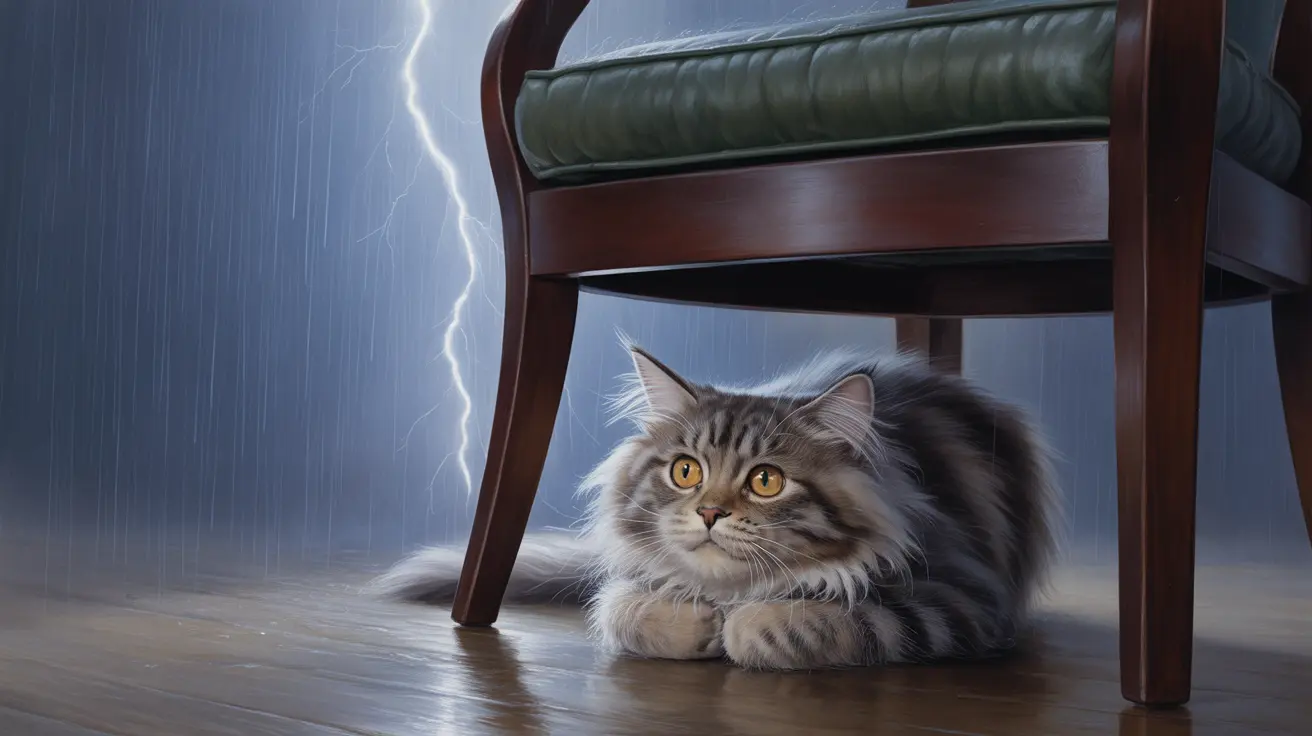If you've ever noticed your cat having an unexpected accident during a thunderstorm or when meeting new people, you're not alone. Cats can indeed pee when scared, and this behavior, while concerning for pet owners, is actually a natural stress response in some felines. Understanding why cats exhibit this behavior and how to help them cope with fear-induced urination is crucial for maintaining both their physical and emotional well-being.
This comprehensive guide will explore the reasons behind fear-based urination in cats, identify common triggers, and provide practical solutions to help your feline friend feel more secure in their environment.
Understanding Fear-Based Urination in Cats
When cats experience intense fear or anxiety, their bodies can respond with involuntary urination. This reaction isn't deliberate - it's a physiological response triggered by their nervous system's fight-or-flight mechanism. Unlike territorial marking or litter box issues, fear-induced urination typically occurs in specific situations that cause extreme stress or anxiety.
Common Triggers for Scared Cat Urination
Sudden Environmental Changes
Cats are creatures of habit, and significant changes in their environment can trigger fear-based urination. These changes might include:
- Moving to a new home
- Home renovations
- Rearranging furniture
- Introduction of new pets or family members
Threatening Situations
Various scenarios can make cats feel threatened enough to urinate involuntarily:
- Loud noises (thunderstorms, fireworks)
- Aggressive encounters with other pets
- Unfamiliar visitors
- Being cornered or trapped
Medical Considerations
While fear can cause urination in cats, it's essential to rule out medical conditions that might contribute to or mimic this behavior. Common medical issues include:
- Urinary tract infections
- Bladder stones
- Feline interstitial cystitis
- Age-related incontinence
Prevention and Management Strategies
Creating a Safe Environment
Reducing stress in your cat's environment is crucial for preventing fear-based urination:
- Provide multiple hiding spots
- Create elevated spaces for escape
- Maintain consistent daily routines
- Use calming pheromone products
Behavioral Training
Working with your cat to build confidence can help reduce fear-based urination:
- Gradual exposure to scary situations
- Positive reinforcement training
- Regular play sessions
- Consistent feeding schedules
Frequently Asked Questions
Do cats pee when scared, and what does fear-induced urination look like?
Yes, cats can pee when scared, and it typically appears as small amounts of urine released suddenly during stressful situations. This is different from normal urination and often occurs wherever the cat happens to be when frightened.
Why would a cat pee outside the litter box instead of inside when stressed or anxious?
When cats are stressed or anxious, they may avoid their litter box because they associate it with vulnerability or because they can't reach it in time during a fear response. Sometimes, they may seek out their owner's belongings for comfort and security.
How can I stop my cat from peeing due to fear or anxiety, and what should I do if it happens?
To prevent fear-based urination, identify and minimize triggers, create safe spaces, and consider using calming aids like pheromone diffusers. If it happens, clean the area thoroughly with enzymatic cleaner and avoid punishing your cat, as this will only increase their anxiety.
Are certain cats—like kittens, seniors, or nervous cats—more likely to pee when frightened?
Yes, kittens, senior cats, and naturally anxious cats are more prone to fear-based urination. Kittens have less bladder control, seniors may have weakened muscles, and nervous cats are more sensitive to stress triggers.
Should I be worried if my cat pees when scared, or could it be a sign of a medical problem?
While occasional fear-based urination might not be serious, frequent episodes warrant a veterinary check-up to rule out underlying medical conditions. Always consult your vet if this behavior becomes regular or is accompanied by other symptoms.
Conclusion
Fear-based urination in cats, while distressing for both pets and owners, is manageable with proper understanding and intervention. By creating a secure environment, identifying triggers, and working with your veterinarian when needed, you can help your cat feel more confident and reduce instances of stress-related accidents.
Remember that patience and compassion are key when dealing with this issue. Never punish your cat for fear-based urination, as this will only exacerbate their anxiety and potentially worsen the problem.






